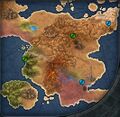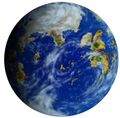Terisian Isles: Difference between revisions
>Hunterofsalvation |
>Hunterofsalvation |
||
| Line 8: | Line 8: | ||
==Geography== | ==Geography== | ||
The original continent surrounded by the '''Shielded Sea''' has been broken up into smaller islands. The '''Sea of Laments''' now lies in the middle of the old continent. To the west lie the '''Ilesemare Sea''' and the '''Endless Sea''' and [[Otaria]], to the northeast lie the '''Videnthian Sea''' and [[Greater Videnth]], | The original continent surrounded by the '''Shielded Sea''' has been broken up into smaller islands. The '''Sea of Laments''' now lies in the middle of the old continent. To the west lie the '''Ilesemare Sea''' and the '''Endless Sea''' and [[Otaria]], to the northeast lie the '''Videnthian Sea''' and [[Greater Videnth]], to the east lies the '''Visceral Sea''', and to the south the Shielded Sea and the continent of [[Sarpadia]].<ref name="Return 1">{{DailyRef|magic-story/return-dominaria-episode-1-2018-03-21|Return to Dominaria, Episode 1|[[Martha Wells]]|March 21, 2018}}</ref><ref name="The End">{{DailyRef|news/magic-story/the-brothers-war-episode-1-the-end|The Brothers' War - Episode 1: The End|[[Miguel Lopez]]|October 20, 2022}}</ref> | ||
===Locations=== | ===Locations=== | ||
Revision as of 08:37, 4 November 2022
| Terisian Isles | |
|---|---|
| Information | |
| Plane | Dominaria |
| Status | Current |
| Formerly part of | Terisiare |
The Terisian Isles or Lost Continent are a group of continents and small islands formed after the Ice Age meltdown flooded much of Terisiare.
Geography
The original continent surrounded by the Shielded Sea has been broken up into smaller islands. The Sea of Laments now lies in the middle of the old continent. To the west lie the Ilesemare Sea and the Endless Sea and Otaria, to the northeast lie the Videnthian Sea and Greater Videnth, to the east lies the Visceral Sea, and to the south the Shielded Sea and the continent of Sarpadia.[1][2]
Locations
Lat-Nam
- The School of the Unseen, the newest college of wizardry.
- The City of Shadows, a secretive training ground for mages.
Gulmany
- Efuan Pincar
- The Kovrian Wastelands
- Oran Ridge, a massive mountainous area in the northwest of the continent.
- The Ronom Glacier, the coldest part of the continent.
- Yumok, a rival of Sarinth along the mountainous northern coast.
- Shingol, a fishing village on the west coast.[3]
- Colekgan Mountains
- Urhulaan Valley [3]
- Eln Forest [3]
Almaaz
- Almaaz, one of the most ancient kingdoms during the time of the Brothers. The only country that didn't collapse in the wake of the War.
- Sumifa, its capital
- The Halquina Mountains, the backbone of the southwestern peninsula. Now half-flooded, some of the peaks form an archipelago.
- Fallajia, several different tribes of desert nomads.
New Argive
- New Argive, the main nation of the continent
- Balduvian Steppe, a vast region of New Argive, northwest of the Karplusan Mountains.
- The Karplusan Mountains. Prior to the Brothers' War this region was known as the Sardian Mountains.[4]
- Epityr, an ancient settlement and center of learning.
- Argivia, the capital
- The Kher Ridges, a mountainous region
- Caves of Koilos, a network of caves containing the last technological remnants of the Thran and a planar portal to Phyrexia
- Kher Keep, lair of Kobolds
- Mishra's Fortress, located west of Koilos.
- Urza's Tower, located near the Kher Ridges.
- Yotia was the most southern of the coastal kingdoms, and the one suffering the brunt of Fallaji raiding parties before the outbreak of the war.
- The Sword Marches
- The Flarg, was a mountainous region infested by goblins.[5]
- Korlis, a fading human civilization in the south.
- Krov, the capital city of Korlis
- Soldev, a semi-autonomous city in the north, located on the ruins of Storgard
Yavimaya
- Yavimaya Forest, a forest located on the west bank of the Yavimaya River.
- Ruins of Kroog
Argoth
- The Shattered Isles, remnants of Fyndhorn south of the mainland.
Other locations
- Jharth, one of the smaller islands of the archipelago, between New Argive and Gulmany.
- The Deep-sea trench connecting Terisiare with Sarpadia
- Iwset and Jehesec, two small island states off the west coast.[3]
- Alsoor, a city that was destroyed by diabolic machines.[6] Voska lived near it, and here Jodah had his first escape from Primata Delphine.
- Pitdown the location a three-way battle between Alsoor, Ghed and a goblin host.
- Ghed, a port city three days' travel to the southwest from Alsoor.
- Coireall, the site of a famous, contested tower.[7]
- The Scarwood, a wooded region plagued by bandits, goblins, hags, and scavenger folk.
- Thorn. Tivadar hailed from this town. He and his Knightly Order, aided by the wizard Rasputin Dreamweaver, temporarily restored civilization to Terisiare by throwing back the Goblin Invasions with their Crusade. This brought a close to the period known as 'The Dark Age.'
In-game references
- Referred to:
Maps of Terisiare
-
Map of Eastern Terisiare after the Mending ©2011-2014 Wizards of the Coast, Inc.
-
Map of Terisiare around 4560 ©2018 Wizards of the Coast, Inc.
-
A more detailed map of Terisiare around 4560 ©2018 Wizards of the Coast, Inc.
-
Globe of Dominaria. The continent on the far left is Terisiare (Around 4000 AR) ©2001 Wizards of the Coast, Inc.
-
A close-up of the previous map, with increased gamma. So Terisiare is more clearly visible (Around 4000 AR) ©2001 Wizards of the Coast, Inc.
-
The art of Invasion Plans also shows a globe of Dominaria with Terisiare on the left (4205 AR) ©2001 Wizards of the Coast, Inc.
Sources
References
- ↑ Martha Wells (March 21, 2018). "Return to Dominaria, Episode 1". magicthegathering.com. Wizards of the Coast.
- ↑ Miguel Lopez (October 20, 2022). "The Brothers' War - Episode 1: The End". magicthegathering.com. Wizards of the Coast.
- ↑ a b c d Robert E. Vardeman (1996). Dark Legacy, HarperPrism.
- ↑ Magic Arcana (July 30, 2007). "Colossus of the Sardian Range". magicthegathering.com. Wizards of the Coast.
- ↑ Goblins of the Flarg
- ↑ Flavor text for Diabolic Machine
- ↑ Tower of Coireall






